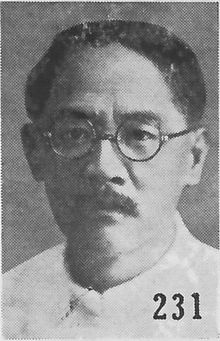Eugene Chen
Eugene Chen | ||
|---|---|---|
陳友仁 | ||
 Eugene Chen as pictured in The Most Recent Biographies of Chinese Dignitaries | ||
| Minister of Foreign Affairs | ||
| In office June 1, 1931 – 1932 | ||
| Preceded by | Alfred Sao-ke Sze | |
| Succeeded by | Luo Wengan | |
| Personal details | ||
| Born | 2 July 1878 Reorganized National Government of the Republic of China | |
| Resting place | Babaoshan Revolutionary Cemetery, Beijing, China | |
| Political party | Kuomintang | |
| Spouses | ||
| Children |
| |
| Wade–Giles | Ch'en Yu-jen | |
Eugene Chen or Chen Youren (
Early Biography
Childhood
Chen was born in
Education
After attending a Catholic school, St Mary's College, Trinidad, Chen qualified as a barrister and became known as one of the most highly skilled solicitors in the islands.
Professional life
After graduating from university, Chen eventually left Trinidad and Tobago to work in
After Sun was forced to flee to Japan in 1913, Chen remained in Beijing (Peking), where he began a second career in journalism. Chen edited the bilingual Peking Gazette 1913–1917, then founded the Shanghai Gazette, the first of what Sun envisioned as a network of newspapers across China.
Chen's revolutionary diplomacy
Chen's diplomacy led one historian to call him "arguably China's most important

In January 1927, the Nationalists forcibly took control over the British concession in Wuhan, and when violent crowds also took the foreign concession at
Life working at
Personal life
In 1899, Chen married Agatha Alphosin Ganteaume (1878–1926), known as Aisy, a
Aisy died of breast cancer in May 1926. Chen and Georgette Chen were married in 1930 and remained together until his death in 1944.
Sources
- Percy Chen, China called Me: My Life Inside the Chinese Revolution. Boston: Little Brown, 1979. 423p. ISBN 0316138495. A memoir by Eugene Chen's son, including accounts of his father's activities in 1920s politics and the automobile caravan from China to Moscow in 1927.
- Yuan-Tsung Chen. Return to the Middle Kingdom: One Family, Three Revolutionaries, and the Birth of Modern China. New York: Union Square Press, 2008. ISBN 9781402756979. Google Books[14]A memoir by Jack Chen's wife which intertwines family and national history from the early 1900s to the end of the 20th century.
- Si-lan Chen Leyda, Footsteps to History (New York: Dance Horizons, 1984). A memoir by Eugene Chen's daughter of her life in international dance, including study in the Soviet Union.
- Reviewed by Renée Renouf at JSTOR
- 钱玉莉 (Yuli Qian), 陈友仁传 (Chen Youren Zhuan) (Shijiazhuang: Hebei ren min chu ban she, 1999 ISBN 7202026716).
Sources
- "Roots and Branches," (website of J. Acham-Chen (Eugene Chen's grandson) Archived June 19, 2012, at the Wayback Machine
- Colonial Office No. 36535/1927 15 February 1927, including: 1) Copy secret despatch of 20 January from Governor of Trinidad furnishing particulars regarding family of Mr. Ch’en who was for a long time resident in the colony; Minutes (i.e. Notes): “This record does not inspire confidence in Mr. Chen, who I should think will prove to be one of the ephemeral phenomena of Chinese politics”; Very much of an adventurer in type. 2) “Report,: H.A. Byatt, Governor [Trinidad]; 3) “Note supplied by Mr. H. Noble Hall, one time correspondent of the Times at Washington on the early career and character of Chen in Trinidad”; 3) Cutting from “Far Eastern Times, by W. Sheldon Ridge; “Life Story of Eugene Chen” (furnished by American Legation, July 1927).[3]
References
- ^ https://web.archive.org/web/20120418205323/http://www.yuantsungchen.com/images/Birth%20Certificate%20-%20Jack.jpg. Archived from the original on April 18, 2012. Retrieved October 13, 2012.
{{cite web}}: Missing or empty|title=(help) - ^ Howard L. Boorman; Richard C. Howard (1967). "Eugene Chen". Biographical Dictionary of Republican China. I. New York: Columbia University Press: 180–183.
- ^ a b "Colonial Office Report: Eugene Ch'en" (PDF). 15 February 1927. Archived from the original (PDF) on 29 October 2013.
- ^ Boorman, p. 180.
- ISBN 9789766400217. Archived from the originalon January 1, 2014. Retrieved October 13, 2012.
- ^ "China Heritage Newsletter". Archived from the original on October 29, 2013. Retrieved October 13, 2012.
- ^ "Peking Gazette" (PDF). Archived from the original (PDF) on February 16, 2012. Retrieved October 13, 2012.
- ^ Boorman, p. 181.
- ^ Philip C.C. Huang, "Biculturality in Modern China and in Chinese Studies," Modern China 26.1 (2000), p. 13.
- ^ Boorman, p.182-183
- ^ Percy Chen, China Called Me: My Life Inside the Chinese Revolution (Boston: Little Brown, 1979)
- ^ Boorman, p. 180-181.
- ISBN 9781402756979. Retrieved 2015-03-01.
- ISBN 9781402756979. Retrieved 2015-03-01.
